|
|
|
Sort Order |
|
|
|
Items / Page
|
|
|
|
|
|
|
| Srl | Item |
| 1 |
ID:
148346
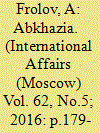

|
|
|
|
|
| Summary/Abstract |
THE COLLAPSE of the socialist world late in the 20th century and the redivision of its territory resulted in the emergence of new independent states, some of which are generally recognized while others are labeled self-proclaimed. But no matter how a new state finds its way onto the map, there will have been deep historical and cultural reasons for its coming into being. One of the new states is Abkhazia.
|
|
|
|
|
|
|
|
|
|
|
|
|
|
|
|
| 2 |
ID:
151595
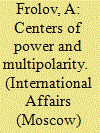

|
|
|
|
|
| Summary/Abstract |
IN 1983, VLADIMIR LUKIN* brought out a book that became a landmark not only for the Institute for the U.S. and Canadian Studies of the Soviet Academy of Sciences, where he worked at that time, but for the entire Soviet scholarly community. It was per se remarkable that the book, entitled Centers of Power: Concepts and Realities, was published at a time when, let me remind you, the Soviet-American confrontation and the rivalry between the two world systems reached their peak and, let's face it, each system professed an ideology that essentially painted a black-and-white picture of the world and claimed to be superior to the other system. Few people could have thought in those days that that state of affairs could come to an end any time soon. The United States was getting ready for a grueling struggle with the Soviets. Almost nobody in either country thought that any third party would ever come forward and throw down the gauntlet to the world's two superpowers. Each system was getting ready for its own historic victory and saw the rest of the world as so many pieces on the chessboard.
|
|
|
|
|
|
|
|
|
|
|
|
|
|
|
|
| 3 |
ID:
102831
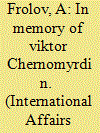

|
|
|
|
|
| Publication |
2011.
|
| Summary/Abstract |
ON 3 NOVEMBER, 2010, Viktor Stepanovich Chernomyrdin - a man who made history, a strong manager, a "red director," a production organizer, a national minister, and a political heavyweight, just to give a few of the ways he was described - passed away. I would also add that a lifetime diplomat, skilled in negotiations and compromises, passed away. His friends and family called him simply Stepanich, while his coworkers kept it even shorter - boss. And when calling Russian leaders by their initials became popular, he was the first for whom it naturally took hold - CheVeEs. It is difficult to present a more or less complete picture of this man's activity within the scope of one article, so I will draw only a few lines of his portrait based on my personal observations and contacts with him.
|
|
|
|
|
|
|
|
|
|
|
|
|
|
|
|
| 4 |
ID:
092592
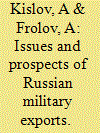

|
|
|
| 5 |
ID:
164204
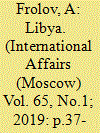

|
|
|
|
|
| Summary/Abstract |
LIBYA AND SYRIA are among the states crushed by the tragic events of the color revolutions of the early 2010s. External invasion, no matter how limited as compared with what happened in Syria, is an instructive factor of recent history of the state and its leader Muammar Gaddafi and a lesson that deserves a space in textbooks. Libya was smashed into pieces and plunged into enmity and rivalry. Anybody wishing to assess the prospects of crisis settlement should turn to the heritage and the integrating principles that kept the country together up to the events of 2011.
|
|
|
|
|
|
|
|
|
|
|
|
|
|
|
|
| 6 |
ID:
137335
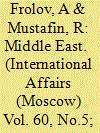

|
|
|
|
|
| Summary/Abstract |
The Ukrainian crisis eclipsed the Middle East and the Arab revolutions which, however, have not disappeared without trace. Seemingly identical and deceptively monochrome, they rolled across the Arab world revealing their specifics and bringing very different results ranging from a backtrack revolution in Egypt to chaos and instability in Libya, from the regime's firmer grip on power in Yemen, to what looks like chronic confrontation in Syria and a complete failure in Bahrain. The Middle East has come close to the threshold of modernization of social relations and the style of governance, even though there is a widely accepted opinion that in 2013 the revolutions exhausted their vigor.
|
|
|
|
|
|
|
|
|
|
|
|
|
|
|
|
| 7 |
ID:
189800
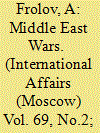

|
|
|
|
|
| Summary/Abstract |
"The first, the grandest, and most decisive act of judgment which the Statesman and General exercises is rightly to understand ... the War in which he engages, not to take it for something, or to wish to make of it something, which by the nature of its relations it is impossible for it to be."
|
|
|
|
|
|
|
|
|
|
|
|
|
|
|
|
| 8 |
ID:
177544
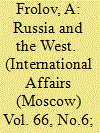

|
|
|
|
|
| Summary/Abstract |
Historically, Russia and the West (countries of Western Europe, but now also of Central Europe) are connected by a relationship based on a long-running and complex dichotomy. The great classic novel War and Peace initially exudes a sense of admiration that high society in the Russian empire had for all things foreign (Western), including the ubiquitous use of French in small talk, but in the end, there was the Patriotic War with Napoleon, the largest war in the 19th century. Russia (later the USSR) instinctively tried to catch up with the West, to overtake it in some respects, and to participate in its affairs, and vice versa, but Russia almost always was either at war with it or joined its coalitions. It so happens that over the past 200 years, the most horrible and devastating wars have come from the West. In the Soviet days, the West was anathematized at the official level, while there was nothing cooler for members of the younger generation than to wear American blue jeans, own a U.S.-made portable audio system, listen to American music, and smoke American
|
|
|
|
|
|
|
|
|
|
|
|
|
|
|
|
| 9 |
ID:
156335
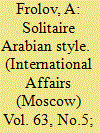

|
|
|
|
|
| Summary/Abstract |
LAST SPRING, an event in the Arab world shocked everyone. The Kingdom of Saudi Arabia (KSA), Bahrain and the United Arab Emirates (UAE) withdrew their ambassadors from Doha, the capital of Qatar, their ally. One of the smallest members of the Cooperation Council for the Arab States of the Gulf (GCC) was accused of supporting "anyone threatening the security and stability of the GCC whether as groups or individuals - via direct security work or through political influence ... and hostile media."
|
|
|
|
|
|
|
|
|
|
|
|
|
|
|
|
| 10 |
ID:
153459
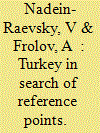

|
|
|
|
|
| Summary/Abstract |
A. Frolov: Having left the deplorable crisis behind, Russia and Turkey added positive energy to their bilateral relations even though unanimity on certain issues is impossible for objective reasons. For obvious reasons, these relations should be discussed in the context of the deep-cutting political and social transformations unfolding inside the Turkish society, the root of the current ups and downs of Turkish politics.
|
|
|
|
|
|
|
|
|
|
|
|
|
|
|
|
| 11 |
ID:
143721
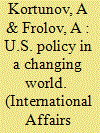

|
|
|
|
|
| Summary/Abstract |
A. Frolov (A.F.): The U.S. foreign policy today has fallen on hard times. The world is entering a new era with a lot of totally new challenges, including untraditional challenges that the U.S. leadership is faced with. In some instances, Washington manages to fit into ongoing processes while in others, the situation starts to follow a different scenario and then this policy, which is based on a number of important and fundamental principles, begins to founder.
|
|
|
|
|
|
|
|
|
|
|
|
|
|
|
|
| 12 |
ID:
161081
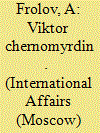

|
|
|
|
|
| Summary/Abstract |
VIKTOR STEPANOVICH Chernomyrdin, a remarkable and original man, a prominent statesman and organizer of industry, a prime minister of Russia, and a politician who has also left his mark on Russia's foreign policy, would have been 80 years old on April 9, 2018.
|
|
|
|
|
|
|
|
|
|
|
|
|
|
|
|
| 13 |
ID:
161080
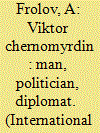

|
|
|
|
|
| Summary/Abstract |
VIKTOR STEPANOVICH Chernomyrdin, a remarkable and original man, a prominent statesman and organizer of industry, a prime minister of Russia, and a politician who has also left his mark on Russia's foreign policy, would have been 80 years old on April 9, 2018.
|
|
|
|
|
|
|
|
|
|
|
|
|
|
|
|
| 14 |
ID:
100181
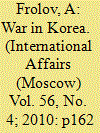

|
|
|
|
|
| Publication |
2010.
|
| Summary/Abstract |
THE 1962 CUBAN CRISIS is most frequently cited as one of the most dangerous confrontations in world history. Even a greater threat for mankind was perhaps the Korean War of 1950-1953 that brought in its wake crushing losses for the people and economics of both North Korea and South Korea in terms of millions of human lives and destruction. The current tensions on the Korean peninsula have to do with the development of nuclear weapons by Pyongyang and, in a sense, with that war. Nuclear weapons proliferate where the threat to use them is very high. The USSR and the USA, which supported the warring sides, were causing an escalation of the conflict trying to outdo each other by supplying unheard of amounts of weaponry for that local war as they themselves were gradually and increasingly being drawn into combat operations. This is the only war in the USSR's history where its armed forces were fighting against the U.S. armed forces. The war came close to becoming global and to an exchange of nuclear strikes. This is why now, after 60 years on, the experience of the Korean War should serve as a stark reminder to those who are not averse to flex muscles.
|
|
|
|
|
|
|
|
|
|
|
|
|
|
|
|
| 15 |
ID:
169519


|
|
|
|
|
| Summary/Abstract |
TWENTY YEARS AGO, NATO unleashed a war in the very heart of Europe against the Federal Republic of Yugoslavia (FRY) that left blood-chilling memories on the continent. It brought destruction, loss of numerous civilian lives, serious social and political problems in Europe and elsewhere in the world, juridical disagreements, conflicts and crises not yet resolved by either the European or world community.
|
|
|
|
|
|
|
|
|
|
|
|
|
|
|
|
|
|
|
|
|